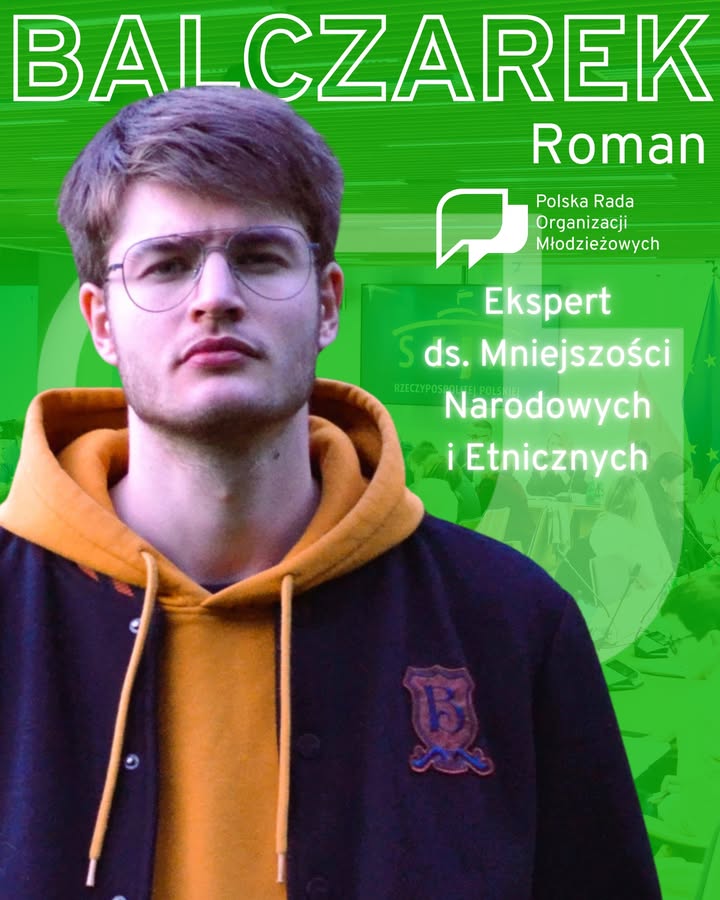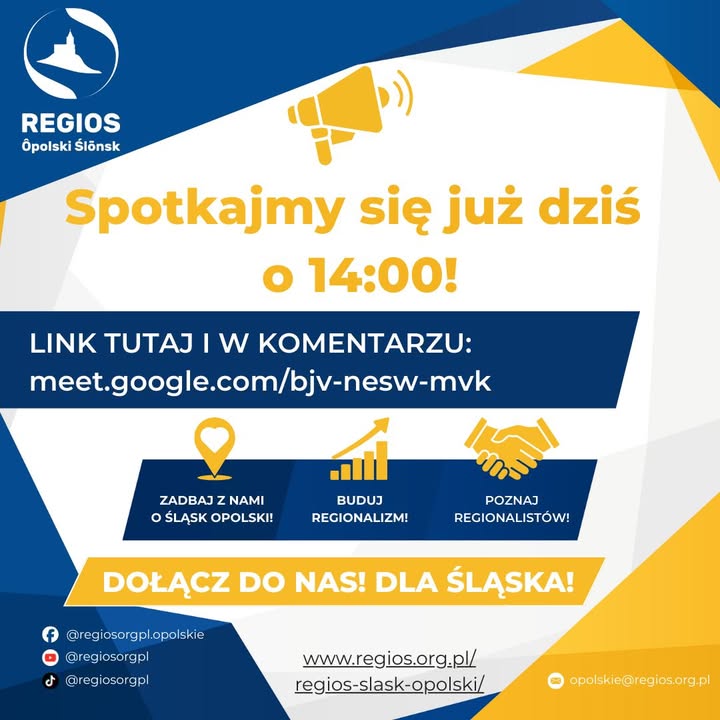REGIOS – REGIONS OF THE FUTURE
We are a group of activists who hold regionalism close to our hearts. We come from different backgrounds and different parts of the Europe. However, we are united by a common denominator – a passion for the idea of civic regionalism. We believe that a country is as strong as its regions, and the European Union is as strong as its member states. It is decentralized countries, where regions play an important role, that are characterized by a high standard of living, a friendly civil society, and innovation. Join us and let’s build the regions of the future together!
REGIOS Association

REGIONS FOR EVERYONE
Regionalism is an idea that aims to strengthen the competences of regions and provide them with funding so that they can better serve society. Weak regions have never been and are not attractive, while strong ones strongly attract and encourage people to tie their future to them. Below are some values that we believe will strengthen the bonds between citizens of a given region and the relationship between citizens and their regions. These values guide us in our activities. Do you share them? Don’t wait, get in touch with us! Let’s build the regions of the future together.
European regions
The fate of the regions currently within Poland’s borders varied greatly and was linked to different cultural circles. However, Poland’s accession to the European Union, together with its regions, sealed its desire to join the Western European cultural and political world. Even today, we cannot imagine our regions outside the European Union or Europe without them. We are supporters of the democratic federalization of the European Union with strong regions within its structures. We are also aware that the only guarantee of security for present and future generations is to make regional interests European interests and European interests regional interests. However, this will not happen until the state apparatus stops perpetuating nationalist sentiments that should have been buried in the dustbin of history long ago.
Innovative regions
The peripherality of our regions’ economies in relation to globalization processes is constantly increasing. For example, Silesia, once one of the most industrialized regions of Western Europe, is moving towards becoming a depopulated post-industrial and agricultural region of Eastern Europe. Decades of neglect cannot be made up for in a few years by relying on the populist slogans of the current mainstream. A long-term perspective for regional development must take into account the interdependence of education, science, the labor market, research and development, technology transfer, and digitization. We see an innovative knowledge-based economy as an opportunity for all regions. As examples from other countries show, only high and wise spending on science and research and development guarantees stable GDP growth and a high standard of living.
Multicultural regions
For centuries, Silesia has been a melting pot of cultures, languages, and religions. The same is true today: for Poles, Silesians, Germans, Czechs, and many others, Silesia has become a small, familiar homeland – a Hajmat. We therefore regard it as a model of tolerance and coexistence between different cultural, religious, and linguistic groups. Today, we are facing the challenges of mass migration, which is changing the social landscape of Europe. Bearing in mind the experiences of different regions and future challenges, we want to guarantee the rights of national, ethnic, cultural, and sexual minorities and create a wise and realistic migration policy with an integrative model of multiculturalism. We believe that the protection of the rights of minorities of all kinds should be guaranteed by law and administration and reflected in electoral regulations that limit the cementing of the political scene.
Decentralization and a state strengthened by its regions
Most Western European countries adopt a federal or regionalist model of administrative division, with a strong position for local government. There can be no strong democracy or stable states without strong regions and local governments. We recognize that political, administrative, and economic decentralization will strengthen the position of local governments, increase citizen participation in public life, protect democracy from authoritarian centralism, and be a starting point for solving socio-economic problems related to population density imbalances and migration.
Virtual
e-regions
E-state is one of the unique ideas implemented in Estonia, a country with a population of 1.3 million. The country prides itself on its computerization, which is unique in Europe, and its forward-looking solutions in the virtual space. It is often said that they have managed to achieve this precisely because of their relatively small population, which makes it impossible to introduce such solutions in Poland. Therefore, since Poland is too large, we propose that e-region, the equivalent of Estonia’s e-state, be introduced at a more agile regional level. Moreover, virtual space has no borders in the classic sense of the word, and its use would contribute to solving common problems in cross-border areas.
The rule of law and
democracy in practice
Contemporary Europe is facing a wave of crises of the rule of law, which has not spared Poland either. The mechanisms of liberal democracy have been used to create quasi-authoritarian systems with a caricature of democracy based on the will of minimal majorities and discrimination against minorities. We advocate strong mechanisms for monitoring the rule of law within the European Union, the participation of local governments in the mechanisms for monitoring and controlling the justice system, and limiting its centralism.
Area of operation
The REGIOS Association operates throughout Poland. Task Forces in areas where our activity is most intense are marked on the attached interactive map of provinces. Information about our Teams can also be found in the Menu -> About us -> Our Teams.
The partner of the REGIOS Association in the Czech Republic is mSTAN Moravskoslezský kraj.
News
You can find more REGIOS news here →
Mamy świetne wiadomości! Polska Rada Organizacji Młodzieżowych PROM , do której należmy, powołała Zespół Rzeczniczy. W skład zespołu wszedł nasz członek Roman Balczarek, jako ekspert ds. Mniejszości Narodowych i Etnicznych. Roman jest historykiem, dziennikarzem regionalnym, popularyzatorem historii i kultury śląskiej, który bardzo dobrze zna problematykę mniejszościową oraz młodzieży z tych mniejszości. Gratulujemy Romanowi i życzymy powodzenia w nowej roli!
Czy regionalizm i decentralizacja mają przyszłość w Polsce? – Badanie MyPolitics dotyczące młodych wyborców pokazuje, że tak. Co prawda nie padły w nim pytania wprost o samorządności, czy ustroju RP, to odpowiedzi udzielone przez respondentów dają dość jednoznaczny obraz ich poglądów. Z raportu wyczytamy na przykład, że:
– 80% uważa, że szkoły powinny mieć większą swobodę w wyborze programu i metod nauczania.
– 70% uważa, że mowa śląska powinna zostać uznana za język regionalny.
– 2/3 sprzeciwia się inwestowaniu w największe ośrodki naukowe kosztem mniejszych.
Sami jako Stowarzyszenie zrzeszamy członków w różnym wieku, z czego sporą grupę stanowi właśnie młodzież i to w tej grupie odczuwamy często znaczącą otwartość na nowe, świeże i przyszłościowe rozwiązania jakim jest Regionalizm Obywatelski. Wiemy, że regionalizm w Polsce potrzebuje czasu i wieloletniej pracy, ale sygnały, które otrzymujemy napawają optymizmem, że prędzej czy później stanie się on istotną częścią debaty publicznej.
Źródło: data.mypolitics.pl/mlodzi-wyborcy
#młodzież #decentralizacja #regios #regiosorgpl #samorząd
Kto by się spodziewał?🙃 Dotychczasowe działania Prezydenta Karola Nawrockiego nie pozostawiały żadnej nadziei, że podpisze on ustawę o języku śląskim. Trudno nie dopatrywać się tutaj jeśli nie wrogiej, to z pewnością dyskryminującej postawy wobec co najmniej 467,1 tys. osób, które w spisie powszechnym w 2021 roku zadeklarowały używanie języka śląskiego 💛💙. Jest to także wyraz ignorancji wobec licznych apeli naukowców o podpisanie ustawy. Dowodzi to również, że Rzeczpospolita nie dojrzała jeszcze by wziąć pod swoją ochroną pełnię dziedzictwa kulturowego swoich, polskich 🇵🇱, obywateli, w tym Ślązaków i Wilamowian. Główną konsekwencją decyzji Prezydenta będzie brak środków ministerialnych na wsparcie ochrony, zachowania i rozwoju języka śląskiego. Instytucje kulturalne i ośrodki edukacyjne nadal będą musiały gimnastykować się poszukując grantów na działania w tym obszarze. Natomiast młodzież nie będzie mogła wybierać, czy chce się uczyć języka śląskiego w szkołach. Tymczasem Ślązacy (i nie tylko) nadal będą chodzić na spektakle grane w języku śląskim, czytać prozę i poezję w języku śląskim, szukać naklejek "Gŏdōmy po ślōnsku" w sklepach, a nade wszystko – używać języka śląskiego codziennie w domu. Na zakończenie przypominamy -> "Niezależnie od treści zapisów ustawy o MNiE język śląski jest językiem. O tym decydują naukowcy, a nie politycy." #slaski #jezykslaski #regionalizm #decentralizacja #śląsk #językśląski
Nasz oddział Regios Ślōnsk Ôpolski zaprasza na spotkanie informacyjne! 💛💙
Widzimy się już dziś o 14:00 online razem z Wami!
LINK DO SPOTKANIA meet.google.com/bjv-nesw-mvk
Z kim kojarzy Ci się łańcuch ze zdjęcia? To znak rozpoznawczy lokalnego włodarza np. Prezydenta, Burmistrza lub Wójta. Funkcje te łączą rolę organu wykonawczego gminy oraz organu administracji publicznej. Rola Wójta przypisana jest każdej gminie. Tymczasem Burmistrza spotkamy w gminach miejskich lub miejsko-wiejskich, zaś Prezydenta w miastach powyżej 100 tys. mieszkańców. Do zadań Prezydenta (lub Burmistrza) należy między innymi: 👉przygotowywanie projektów uchwał rady gminy (w tym budżetu), 👉opracowywanie programów rozwoju, 👉określanie sposobu wykonywania uchwał, gospodarowanie mieniem komunalnym, 👉wykonywanie budżetu oraz zatrudnianie i zwalnianie kierowników gminnych jednostek organizacyjnych. W praktyce oznacza to, że między innymi zawiera umowy w imieniu gminy oraz decyduje, co dzieje się z nieruchomościami i własnością gminy. Reprezentuje miasto na zewnątrz. Jeżeli prezydent łączy funkcję starosty (miasto na prawach powiatu), wtedy do jego zadań dochodzi między innymi zarządzanie drogami powiatowymi, szpitalem powiatowym, czy prowadzenie szkół ponadpodstawowych. Dlatego przed wybraniem następnego włodarza Waszego miasta, dobrze zastanówcie się, który z kandydatów najlepiej nadaje się na to stanowisko. Niewłaściwa osoba na tym stanowisku może wyrządzić duże szkody dla społeczeństwa i jakości życia mieszkańców danej jednostki samorządu terytorialnego. A czy Wy, popieracie swojego Prezydenta lub Burmistrza? Czy wolelibyście zobaczyć na tym stanowisku kogoś innego? – Napiszcie w komentarzu! #poconamsamorząd #poconamsamorządność #regionalizm #decentralziacja #regios #regiosorgpl







